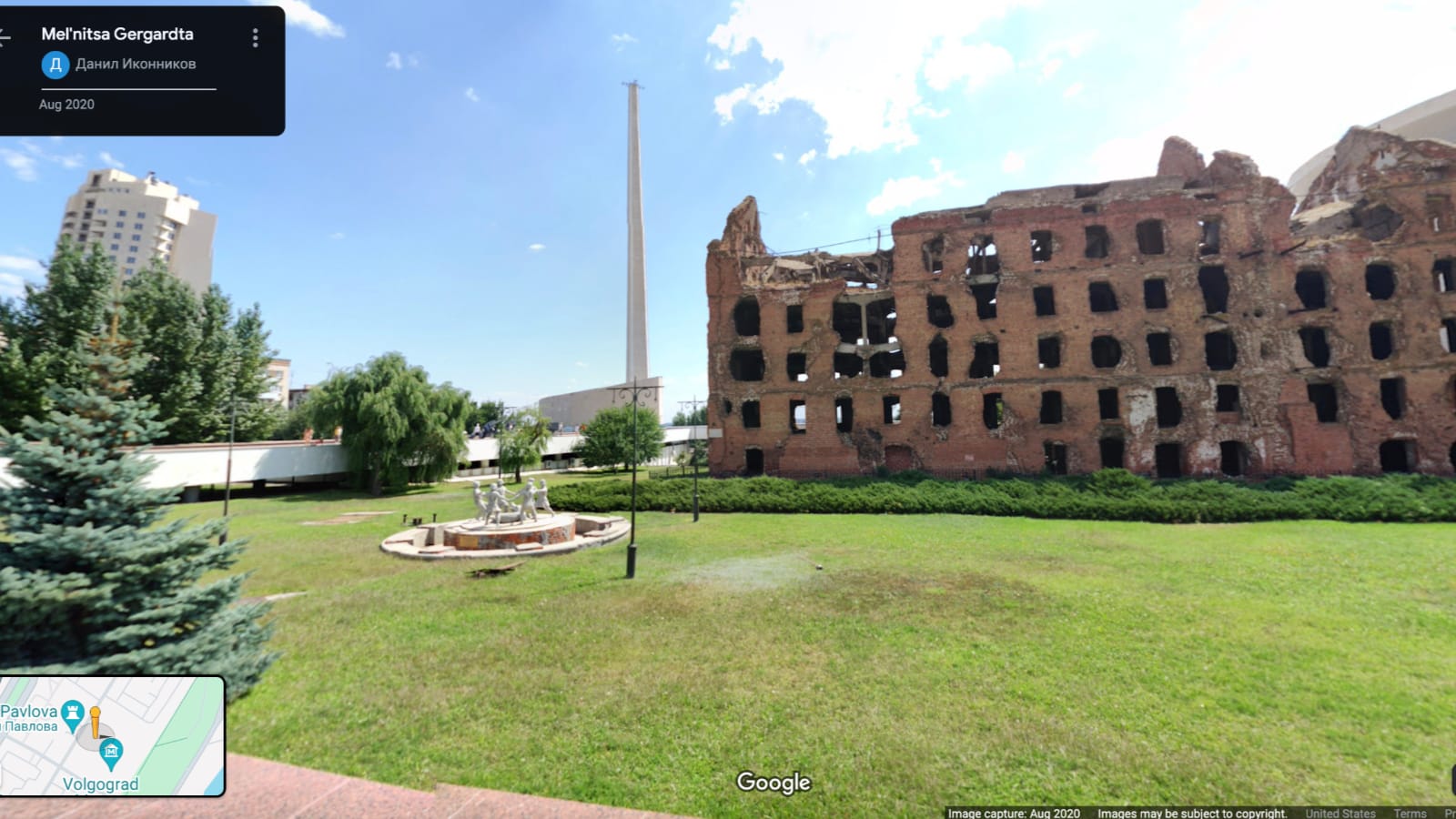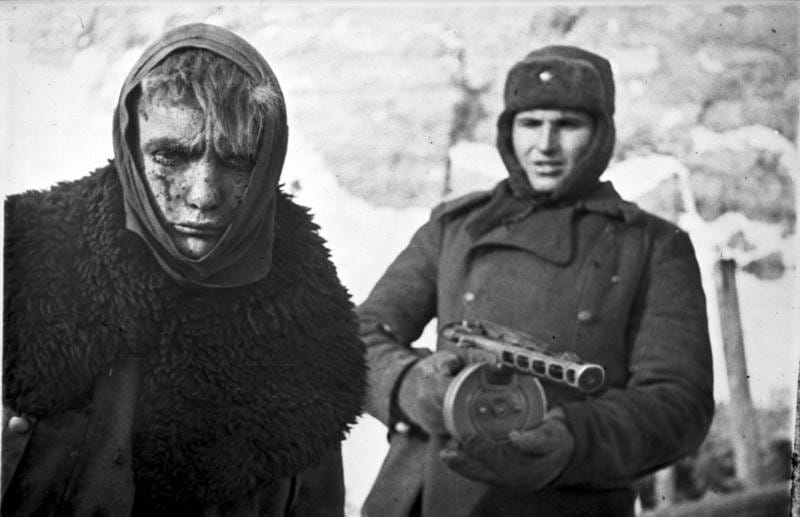The icy surrender: the bitter frozen end of the Battle of Stalingrad.
The end of the most terrible battle ever fought on Earth leaves us with a lot of depressing thoughts about human nature.

Eighty-one years ago this week, on February 2, 1943, the Battle of Stalingrad ended with the surrender of the last organized German units to Soviet forces. Stalingrad was the largest, bloodiest and most costly battle ever fought on planet Earth, the climax of World War II, and the bitter epitome of man’s inhumanity to man. No military engagement before or since has ever been so consequential or so brutal. The battle, which raged for over five months in the city on the Volga, ended in the bitter frozen snows of Russia in late January and early February, less a formal surrender than the ultimate exhaustion of the defeated German army.
The Battle of Stalingrad is a huge topic. Hundreds of books have been written about it. Various films have been made of it–in the English-speaking world probably the most famous of them was Enemy at the Gates starring Joseph Fiennes and Ed Harris, but actually a better film, and more realistic depiction of the battle, is the 1993 German-language film Stalingrad, directed by Joseph Vilsmaier. Military historians and World War II buffs can pore for months–years–over arrows on maps and symbols of tank corps and army groups, but I don’t think any of that can really capture the enormity of what happened there. Hard numbers are difficult to pin down, but about 1.3 million soldiers, German and Soviet, lost their lives in the five months of fighting, and that doesn’t count the approximately 40,000 Russian civilians that were said to have been killed there too. Beginning in the late summer of 1942, Hitler’s Wehrmacht tried to surround and starve out the city, but over the next few months the prime of the German army was essentially fed into a meat grinder at Stalingrad, with tens of thousands perishing in brutal house-to-house fighting and eventually the bitter cold and weather conditions of the unusually cold winter.
I'm very selective about the military history I do, either on this blog or in my videos, first because I'm not that good at it, and second because I think it tends to distort the true stakes and effects of war. Arrows and pins on maps can't communicate what happened. In no case is this more true than with Stalingrad. So I’m not really that interested in which army went where, how many tanks were engaged or where the Germans and Russians established their front lines. I’m trying to imagine a great industrial city of many thousands of people utterly reduced to rubble by artillery fire, with snipers hiding amongst the crumbling ruins, and the incredible white-hot hatred of both sides for one another. Many casual observers don’t realize how incredibly vicious World War II was on the Eastern Front. Both Nazi Germany and the USSR were fighting for what they saw not just as the survival of their nations, but of entire peoples. Turning points like D-Day and Pearl Harbor were what they were, but in the snow-caked ruins of Stalingrad you really get down to the bitter nub of the Second World War, and it was so unbelievably awful it almost defies human understanding.

The horrors of the fighting and the immense amount of ideological and national prestige both Hitler and Stalin poured into Stalingrad make the end of the battle all the more epic. In the final days–after his supply lines were cut off, his ruined armies surrounded and the Luftwaffe incapable of supplying them by air–the German commander, General Friedrich Paulus, knew that his army was finished. The various offensives and counter-offensives that raged for months, especially since December, were petering out. As the Soviets took the Germans’ last two airfields, this meant not only would there be no more supplies, but evacuating the wounded was now impossible. Paulus and his staff took shelter in the concrete basement of a department store under the heart of Stalingrad while Soviet shells rained down.
Hitler was insistent that Stalingrad be taken. It was a matter of national honor that German troops capture the city named for Stalin (before his time it was called Volgograd, which is its name now). On January 22, 1943, Paulus radioed Berlin for permission to surrender. Hitler went berserk. After numerous pleas by Paulus to be allowed to give up, Hitler decided to promote him to the rank of Field Marshal. In Prussian and German military history, no Field Marshal had ever been taken alive by the enemy; essentially it was an order for Paulus to commit suicide. He refused. He knew it was over.
The record is somewhat unclear as to whether Paulus actually surrendered. He insists he did not; he was waiting in another room when Soviet troops burst into the basement, and one of his adjutants supposedly gave up. History, however, records Paulus as surrendering on January 31, 1943. He along with the surviving German officers and nearly 90,000 German soldiers were taken as prisoners of war. Amidst the snow-covered ruins of the city, the guns were mostly silent. Now there were only long lines of freezing, starving prisoners, many of them wounded, and piles of bodies. In the sewers and other isolated pockets of the city, small groups of German stragglers held out, but they were not under any sort of command. The last of them were not reduced until March.

The fate of those who surrendered was a sad one. Very few of them–less than 6,000 out of nearly 110,000 who surrendered–ever returned to Germany. Most died in Soviet P.O.W. camps, usually of disease or exposure. For them the battle was only one signpost on a long road of misery.
Strategically, Germany could not recover from the defeat of Stalingrad. Its army was spent and its political will severely disrupted. Nevertheless, it would be two more bloody years before the Nazis finally surrendered.
Through a great victory for the Soviet Union, the Battle of Stalingrad is in my opinion one of the saddest chapters in recent human history. Its death and ferocity have never been matched since. Let’s hope they never will be.
The Value Proposition
Why should you be reading this blog, or receiving it as a newsletter? This is why.
☕ If you appreciate what I do, buy me a virtual coffee from time-to-time to support my work. I know it seems small, but it truly helps.
📖 You could also buy my newest book.
🎓 Like learning? Find out what courses I’m currently offering at my website.
📽 More the visual type? Here is my YouTube channel with tons of free history videos.



Comments ()